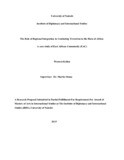| dc.description.abstract | This research examines the role, ability and the potential of regional integrated bloc to respond to
terrorism in EA, which has seen the region as theatre for the most heinous terrorists’ attacks in
the sub-Saharan Africa. The research examines the efforts made by the East African community
(EAC), in particular to counter terrorism, by providing an overview of the apparent vulnerability
of the region, to increasing terrorist related activities and the weak capacities of countries to
respond. The research argues that, although significant progress is being made to develop
coherent counterterrorism approaches in East Africa, many challenges remain. They include
extreme intra- and interstate conflict, increasing Islamic radicalization, lack of state capacity,
competing national priorities and political sensitivity surrounding the very notion of counterterrorism.
Most counter-terrorism efforts have focused on short-term security and law
enforcement efforts, which negatively affect longer-term measures to tackle the primary
conditions that encourage the spread of terrorism. This research analyses the role of regional
actor-the EAC in responding to the challenge of terrorism in EA. Firstly, the research briefly
examines the vulnerability of countries in the region to terrorism and the capacities of EA
countries to respond. Secondly, the research highlights responses to terrorism at the regional
level with a particular focus on de-radicalization, de-politicization of terrorism and security
reforms. The general objective of this research is to examine and analyze the role regional
integration plays in fostering peace and security through combating terrorism. The research
design used in this study is descriptive and explorative research. The study involved mostly the
use of open-ended questions for the primary data collection. The research site in this study
involves Kenya, Uganda, Tanzania, Rwanda and Burundi. For the purpose of this study, the
target population is 100 respondents who included; civil servants, business entrepreneurs,
security agencies and academicians operating in Kenya, Uganda, Tanzania, Rwanda and
Burundi. Purposive sampling approach will be used to ensure that reasonable representative
sample is picked for the groups. A number of data collections methods will be used in this study
and this includes an open ended questionnaire for the key respondents. Secondary data will also
be used in addition to primary data. | en_US |

